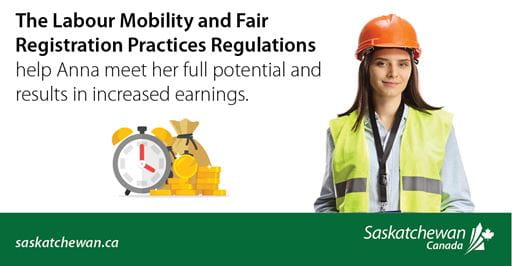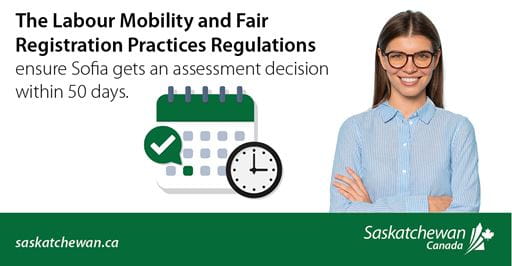Released on December 6, 2022
Newly introduced Labour Mobility and Fair Registration Regulations come into force
Today, Minister of Immigration and Career Training Jeremy Harrison announced new, comprehensive regulations that reduce administrative credential recognition barriers faced by workers from other provinces and those trained internationally, enabling them to work in regulated occupations in Saskatchewan more quickly.
“Under these regulations, regulatory bodies will have 50 days to assess an internationally trained applicant’s training, experience and qualifications and indicate if they are qualified to work in Saskatchewan or what specific steps they need to take to become qualified," Harrison said. Additionally, workers certified in other provinces or territories will receive recognition of their certification within 20 days. These will be the fastest processing times in Canada.”
Saskatchewan has incredible opportunities in nearly all regulated occupations. The introduction of these regulations will reduce the red tape and regulatory burden associated with the assessment of credentials in these occupations, allowing individuals to begin working sooner here in the province.
“I hear from employers every day that the biggest challenge they are facing is an acute labour market shortages. These changes will directly reduce the impact this has on Saskatchewan by expanding the talent pools and increasing the human resources necessary to support the continuing growth of our province,” Harrison said.
The regulations, entitled The Labour Mobility and Fair Registration Practices Regulations, were brought in under The Labour Mobility and Fair Registration Practices Act, which was introduced earlier this year. Examples of regulated occupations include: professional engineers; physicians; surgeons; lawyers; teachers; and registered nurses.


The province is also developing the International Credential Recognition Grant (ICRG) to assist newcomers with foreign qualification recognition costs required to obtain licensure. Providing up to $6,000 per application, this program will target internationally trained, health care workers who already reside in Saskatchewan but have been unable to obtain licensure. By implementing aggressive timelines and providing navigation and financial supports for internationally trained newcomers, Saskatchewan is becoming a top destination of choice for skilled workers.
With the Government of Saskatchewan’s Health Human Resources (HHR) Action Plan showing solid progress, these regulatory changes will improve the pathway for internationally educated health care professionals to transition to Saskatchewan. In November, the Minister of Health, officials from the Saskatchewan Health Authority and the Ministry of Immigration and Career Training participated in an HHR-based mission to the Philippines to attract health care professionals to the province.
Further details for prospective international applications are available online at: https://www.saskatchewan.ca/residents/jobs-working-and-training/labour-mobility.
-30-
For more information, contact:
Sam Sasse
Immigration and Career Training
Regina
Phone: 306-530-6917
Email: sam.sasse@gov.sk.ca


